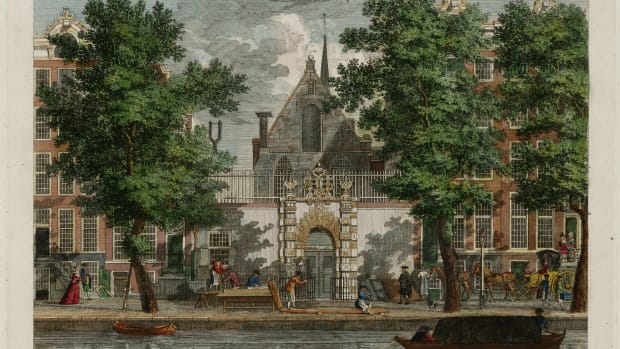
UvA to investigate its own colonial past
Next spring, the UvA will launch a major research project investigating its own involvement in the Dutch colonial and slavery history. According to a statement by the UvA, the research will be conducted by an “independent and renowned institute” with expertise in this field, which is yet to be determined.
Like any self-respecting institution, the UvA is now also going to investigate its own colonial and slavery history. A research assignment is currently being developed for this purpose, which will be outsourced. The institute to which the contract will be awarded will be announced later this spring, but possible candidates include the NIOD, the Royal Tropical Institute, the National Institute for Dutch Slavery History and Legacy, or the Royal Netherlands Institute of Southeast Asian and Caribbean Studies. A social and scientific advisory committee will be set up for this research, which will also involve experts from the UvA.
Caspar Barlaeus
The nearly 400-year-old UvA was founded in 1632 as the Athenaeum Illustre. One of its first professors was the philosopher, poet and preacher Caspar Barlaeus, whose portrait can still be seen in the courtyard of the Oudemanhuispoort. “In 1632, Caspar Barlaeus praised the wealthy merchants who founded the Athenaeum Illustre because they combined their entrepreneurial spirit with knowledge and insight. Those enterprises were undoubtedly linked to the colonies and slavery,” says initiator and Central Diversity Officer of the UvA Machiel Keestra. “The municipality of Amsterdam and De Nederlandsche Bank, among others, have already investigated their own history.”
Last January, the UvA celebrated its 391st anniversary. That centuries-old history is reflected in various UvA buildings dating from the colonial era. One example is the Oost-Indisch Huis, which was an office of the Dutch East India Company (VOC). However, not enough is known about the role of the UvA and the Athenaeum Illustre during the colonial era. “This needs to be researched,” says Keestra. “We need to know the facts of our own history, face up to the legacy of that history and be able to account for it.”
Two parts
The research project consists of two parts. It will start with a preliminary investigation to identify which collections, archives and buildings need to be investigated further. This preliminary investigation will form the basis for the actual research, which is likely to take several years. The results of the preliminary investigation will be published in 2024.
The Faculty of Humanities (FGw) is already fully engaged with colonial history. For example, the public programme “Decolonial Dialogues@Humanities” was recently launched. The so-called VOC Room in the Bushuis building displays a historical reconstruction of the VOC’s past, but in recent years, staff and students have become increasingly uncomfortable with the way in which the colonial past of the Netherlands and Amsterdam is presented in this space. That is why the faculty decided to temporarily close the room last year. This year, lectures, performances, podcast recordings and small exhibitions will be organised.


